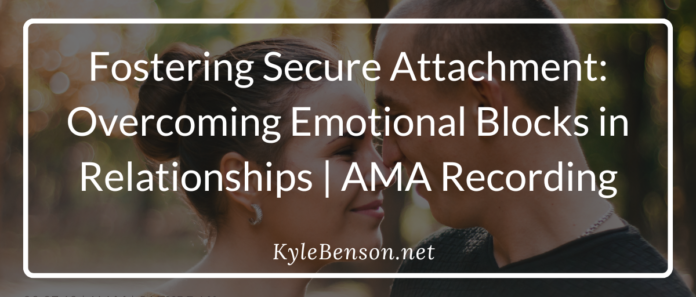Understanding the attachment underpinnings of our connections can be the key to unlocking a deeper, more fulfilling relationship dynamics. The concepts of secure attachment, anxious attachment, avoidant attachment, and disorganized attachment are not just academic terms; they are the threads that weave the fabric of our most intimate relationships.
Recently, I hosted an Ask Me Anything (AMA) session with Kimberly Castelo, a Certified Emotionally Focused Couples Therapist, to shed light on these intricate patterns and offered practical advice for nurturing healthier, more secure bonds.
The Essence of Attachment Styles
At the heart of every relationship lies a pattern of attachment. Secure attachment signifies a relationship characterized by trust, safety, and openness, allowing partners to express their needs and vulnerabilities freely.
However, not all relationships bask in this security. Anxious attachment is marked by a fear of abandonment and a constant need for reassurance, while avoidant attachment is defined by a tendency to maintain emotional distance and prioritize independence over intimacy. Disorganized attachment is seen as someone who comes close for connection but then pulls away when connection is there. Recognizing these attachment styles in ourselves and our partners can be the first step toward healing and growth.
In the AMA, Kim and Kyle explore how to recognize your attachment strategies and taking “Detours” to foster a more secure connection.

Overcoming Emotional Blocks
Every relationship faces its share of challenges, but emotional blocks—those deeply ingrained barriers to intimacy—can be particularly challenging. These blocks often stem from past traumas or unresolved issues, manifesting as fear, distrust, or detachment within the relationship.
Kim and Kyle emphasized the importance of acknowledging these blocks, communicating openly about them, and working collaboratively to overcome them, paving the way for a stronger, more secure bond.
Trust and Intimacy In The Aftermath of Betrayal: Pillars of a Secure Relationship
Trust and intimacy are the pillars of a secure relationship, yet achieving them is no small feat, especially in the aftermath of betrayal or when navigating different attachment styles. Building trust requires patience, consistency, and the willingness to be vulnerable with each other. Emotional and physical intimacy flourishes in an environment of safety and acceptance.
The AMA underscored the role of mutual understanding and effort in cultivating these crucial elements, encouraging couples to engage in honest dialogue and actively meet each other’s needs.

Emotionally Focused Couples Therapy: A Path to Connection
One of the highlights of the AMA was the discussion on Emotionally Focused Couples Therapy (EFCT), a therapeutic approach designed to address the emotional blocks that prevent couples from forming a secure connection. EFCT helps partners understand and respond to each other’s attachment needs, facilitating a move from insecurity and conflict to a place of mutual support and understanding.
Kim and Kyle share examples of working with emotional blocks to intimacy, security, and connection.
Conclusion: The Journey Towards Secure Attachment
The AMA with Kyle and Kim was a powerful reminder that while the path to a secure attachment may be challenging, it is undeniably rewarding. We can build stronger, more resilient relationships by understanding our attachment styles, addressing emotional blocks, and nurturing trust and intimacy. Whether through self-reflection, open communication, or seeking professional guidance, the journey toward a deeper connection with our lovers is worth taking.
Remember, pursuing a secure, loving relationship is not just a destination but a continuous journey of understanding, healing, and unconditional support.
Related
www.kylebenson.net







